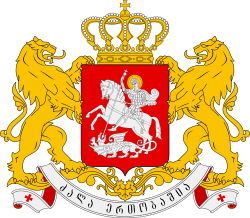Batumi
| Batumi ბათუმი | |||||
|---|---|---|---|---|---|
| |||||
| |||||
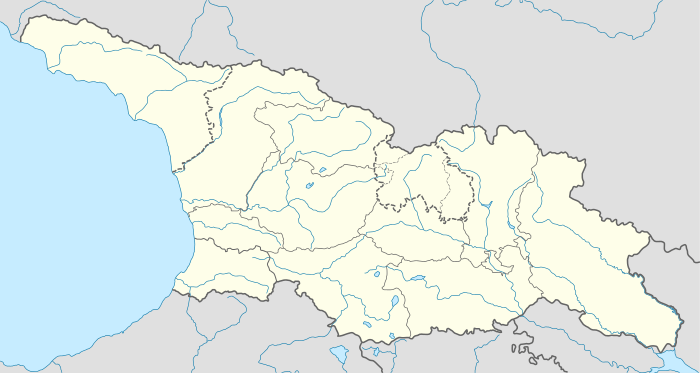 Batumi Location of Batumi in Georgia | |||||
| Coordinates: 41°38′45″N 41°38′30″E / 41.64583°N 41.64167°E | |||||
| Country | Georgia | ||||
| Autonomous republic | Adjara | ||||
| Founded | 8th century | ||||
| City status | 1866 | ||||
| Government | |||||
| • Mayor | Giorgi Ermakov[1] | ||||
| Area | |||||
| • Total | 64.9 km2 (25.1 sq mi) | ||||
| Elevation | 3 m (10 ft) | ||||
| Population (2014[2]) | |||||
| • Total | 152,839 | ||||
| • Density | 2,400/km2 (6,100/sq mi) | ||||
| Time zone | Georgian Time (UTC+4) | ||||
| Postal code | 6000-6010 | ||||
| Area code(s) | (+995) 422 | ||||
| Website | Official website | ||||
Batumi (Georgian: ბათუმი [bɑtʰumi]) is the second largest city of Georgia, located on the coast of the Black Sea in the country's southwest.[2] Situated in a subtropical zone near the foot of the Lesser Caucasus Mountains, Batumi is a popular tourist destination known for its varying weather–it is a bustling seaside resort during warm seasons, but can get entirely covered in snow during winter. Much of Batumi's economy revolves around tourism and gambling, but the city is also an important sea port and includes industries like shipbuilding, food processing and light manufacturing. Since 2010, Batumi has been transformed by the construction of modern high-rise buildings, as well as the restoration of classical 19th-century edifices lining its historic Old Town.[3]
History
Early history
Batumi is located on the site of the ancient Greek colony in Colchis called Bathus or Bathys – derived from the Greek phrase βαθύς λιμεν bathus limen or βαθύς λιμήν bathys limin meaning "deep harbor". Under Hadrian (r. 117–138 AD), it was converted into a fortified Roman port and later deserted for the fortress of Petra founded in the time of Justinian I (r. 527–565). Garrisoned by the Roman-Byzantine forces, it was formally a possession of the kingdom of Lazica until being occupied briefly by the Arabs, who did not hold it; in the 9th century it formed part of the Bagratid monarchy of Tao-Klarjeti and at the close of the 10th century of the unified kingdom of Georgia which succeeded it.
From 1010, it was governed by the eristavi (viceroy) of the king of Georgia. In the late 15th century, after the disintegration of the Georgian kingdom, Batumi passed to the princes (mtavari) of Guria, a western Georgian principality under the sovereignty of the kings of Imereti.
A curious incident occurred in 1444 when a Burgundian flotilla, after a failed crusade against the Ottoman Empire, penetrated the Black Sea and engaged in piracy along its eastern coastline until the Burgundians under the knight Geoffroy de Thoisy were ambushed while landing to raid Vaty, as Europeans then knew Batumi. De Thoisy was taken captive and released through the mediation of the emperor John IV of Trebizond.
Ottoman Rule
In the 15th century in the reign of the prince Kakhaber Gurieli, the Ottoman Turks conquered the town and its district but did not hold them. They returned to it in force a century later and inflicted a decisive defeat on the Georgian armies at Sokhoista. Batumi was recaptured by the Georgians several times, first in 1564 by prince Rostom Gurieli, who lost it soon afterwards, and again in 1609 by Mamia Gurieli. In 1723, Batumi again became part of the Ottoman Empire. With the Turkish conquest, the Islamisation of the hitherto Christian region began but terminated and to a great degree reversed, after the area was re-annexed to Russian Imperial Georgia after the Russo-Turkish War of 1877–78.
Imperial Russian rule
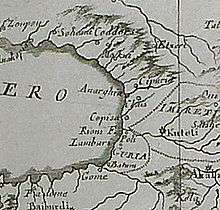
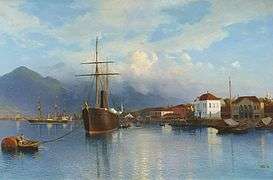
It was the last Black Sea port annexed by Russia during the Russian conquest of that area of the Caucasus. In 1878, Batumi was annexed by the Russian Empire in accordance with the Treaty of San Stefano between Russia and the Ottoman Empire (ratified on March 23) . Occupied by the Russians on August 28, 1878, the town was declared a free port until 1886. It functioned as the center of a special military district until being incorporated in the Government of Kutaisi on June 12, 1883. Finally, on June 1, 1903, with the Okrug of Artvin, it was established as the region (oblast) of Batumi and placed under the direct control of the General Government of Georgia.
The expansion of Batumi began in 1883 with the construction of the Batumi-Tiflis-Baku railway (completed in 1900) and the finishing of the Baku-Batumi pipeline. Henceforth, Batumi became the chief Russian oil port in the Black Sea. The town expanded to an extraordinary extent and the population increased rapidly: from 8,671 inhabitants in 1882 to 12,000 in 1889. By 1902 the population had reached 16,000, with 1,000 working in the refinery for Baron Rothschild's Caspian and Black Sea oil company.[4]
In the late 1880s and after, more than 7400 Doukhobor emigrants sailed for Canada from Batumi, after the government agreed to let them emigrate. Quakers and Tolstoyans aided in collecting funds for the relocation of the religious minority, which had come into conflict with the Imperial government over its refusal to serve in the military and other positions. Canada settled them in Manitoba and Saskatchewan.
War, communism, and late 20th-century independence
During 1901, sixteen years prior to the October Revolution, Joseph Stalin, the future leader of the Soviet Union, lived in the city organizing strikes. On March 3, 1918, the Treaty of Brest-Litovsk gave the city back to the Ottoman Empire; unrest during the closing weeks of World War I led to the re-entry of Turkish forces in April 1918, followed in December by British forces, who stayed until July 1920. Kemal Atatürk ceded the area to the Bolsheviks of the Soviet Union on the condition that it be granted autonomy, for the sake of the Muslims among Batumi's mixed population.
When the USSR collapsed in 1989, Aslan Abashidze was appointed head of Adjara's governing council and subsequently held onto power throughout the unrest of the 1990s. Whilst other regions, such as Abkhazia, attempted to break away from the Georgian state, Adjara remained as an integral part of the Republic's territory. Abashidze exploited the central government's weaknesses and ruled the area as a personal fiefdom. In May 2004, he fled to Russia because of mass protests in Tbilisi sparked by the Rose Revolution.
Present day
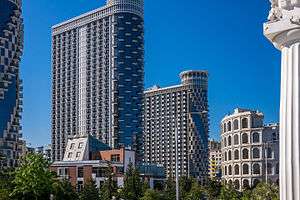
Batumi today is one of the main port cities of Georgia. It has the capacity for 80,000-tonne tankers to take materials such as oil that are shipped through Georgia from Central Asia. Additionally, the city exports regional agricultural products. Since 1995 the freight conversion of the port has constantly risen, with an approximate 8 million tonnes in 2001. The annual revenue from the port is estimated at between $200 million and $300 million.
Since the change of power in Adjara, Batumi has attracted international investors, and the prices of real estate in the city have trebled since 2001. In July 2007, the seat of the Constitutional Court of Georgia was moved from Tbilisi to Batumi to stimulate regional development.[5] Several new hotels opened after 2009, first the Sheraton in 2010 and the Radisson Blu in 2011. The Trump Tower and the Kempinski was scheduled to open in 2013.
Batumi was host to the Russian 12th Military Base. Following the Rose Revolution, the central government pushed for the removal of these forces and reached agreement in 2005 with Moscow. According to the agreement, the process of withdrawal was planned to be completed in 2008, but the Russians completed the transfer of the Batumi base to Georgia on November 13, 2007, ahead of schedule.[6]
In 2013, TAM GEO LLC announced it was investing $70 million to start construction of the 170-meter, 45-storey mix-use complex Babillon Tower, which will be tallest residential building in Georgia.[7]
Climate
%2C_with_skyline_of_Batumi_on_the_horizon.jpg)
Batumi lies at the southern periphery of the oceanic climate (Csb), but it is classified as humid subtropical (Cfa) according to Köppen's classification. The city's climate is heavily influenced by the onshore flow from the Black Sea and is subject to the orographic effect of the nearby hills and mountains, resulting in significant rainfall throughout most of the year, making Batumi the wettest city in both Georgia and the entire Caucasus Region.
The average annual temperature in Batumi is approximately 14 °C (57 °F). January is the coldest month with an average temperature of 7 °C (45 °F). August is the hottest month, with an average temperature of 22 °C (72 °F). The absolute minimum recorded temperature is −6 °C (21 °F), and the absolute maximum is 40 °C (104 °F). The number of days with daily temperatures above 10 °C (50 °F) is 239. The city receives 1958 hours of sunshine per year.
Batumi's average annual precipitation is 2,392 mm (94.2 in). December is the wettest month with an average of 303 mm (11.9 in) of precipitation, while May is the driest, averaging 84 mm (3.3 in). Batumi generally does not receive significant amounts of snow (accumulating snowfall of more than 30 cm (11.8 in)), and the number of days with snow cover for the year is 12. The average level of relative humidity ranges from 70–80%.
| Climate data for Batumi | |||||||||||||
|---|---|---|---|---|---|---|---|---|---|---|---|---|---|
| Month | Jan | Feb | Mar | Apr | May | Jun | Jul | Aug | Sep | Oct | Nov | Dec | Year |
| Record high °C (°F) | 25 (77) |
26 (79) |
28 (82) |
32 (90) |
33 (91) |
36 (97) |
40 (104) |
37 (99) |
34 (93) |
31 (88) |
30 (86) |
28 (82) |
40 (104) |
| Average high °C (°F) | 9.8 (49.6) |
10.4 (50.7) |
13.3 (55.9) |
16.8 (62.2) |
20.2 (68.4) |
23.9 (75) |
25.8 (78.4) |
26.2 (79.2) |
24.2 (75.6) |
21.1 (70) |
16.4 (61.5) |
8.2 (46.8) |
18.02 (64.44) |
| Daily mean °C (°F) | 6.3 (43.3) |
6.6 (43.9) |
8.9 (48) |
12.0 (53.6) |
15.6 (60.1) |
19.3 (66.7) |
22.0 (71.6) |
22.2 (72) |
19.8 (67.6) |
16.5 (61.7) |
12.3 (54.1) |
8.9 (48) |
14.2 (57.55) |
| Average low °C (°F) | 2.8 (37) |
2.9 (37.2) |
4.5 (40.1) |
7.2 (45) |
11.1 (52) |
14.8 (58.6) |
18.2 (64.8) |
18.3 (64.9) |
15.4 (59.7) |
11.9 (53.4) |
8.2 (46.8) |
5.2 (41.4) |
10.04 (50.08) |
| Record low °C (°F) | −5 (23) |
−6 (21) |
−3 (27) |
1 (34) |
5 (41) |
8 (46) |
11 (52) |
11 (52) |
10 (50) |
5 (41) |
−1 (30) |
−4 (25) |
−6 (21) |
| Average precipitation mm (inches) | 242 (9.53) |
188 (7.4) |
145 (5.71) |
111 (4.37) |
84 (3.31) |
163 (6.42) |
152 (5.98) |
207 (8.15) |
248 (9.76) |
278 (10.94) |
271 (10.67) |
303 (11.93) |
2,392 (94.17) |
| Mean monthly sunshine hours | 99 | 105 | 126 | 148 | 199 | 235 | 214 | 223 | 201 | 176 | 125 | 107 | 1,958 |
| Source #1: Climate Data[8] | |||||||||||||
| Source #2: [9] | |||||||||||||
Cityscape
Contemporary architecture
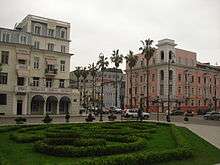
.jpg)
Batumi's skyline has been transformed since 2007 with remarkable buildings and monuments of contemporary architecture,[3] including:[10]
- Radisson Blu hotel
- Public Service Hall
- Hilton Batumi
- Leogrand
A large Kempinski hotel and casino is to open in 2013, a Hilton Hotel as well as a 47-storey Trump Tower is also planned.[11]
Novelty architecture
Novelty architecture in Batumi includes:
- Sheraton Hotel, designed in the style of the Great Lighthouse at Alexandria, Egypt[12]
- Alphabet Tower (145 metres (476 ft) high), celebrating Georgian script and writing
- Piazza, a mixed-used development in the form of an Italian piazza
- Buildings designed in the style of a lighthouse, the Acropolis, and an upside-down White House
Transportation
The city is served by Batumi Airport, one of three international airports in the country. A bike-sharing scheme named BatumVelo allows you to rent a bicycle on the street with a smart card.

Subdivisions
According to the March 31, 2008, decision of the Batumi City Council, Batumi is divided into seven boroughs, those of:
- Old Batumi (ძველი ბათუმის უბანი)
- Rustaveli (რუსთაველის უბანი)
- Khimshiashvili (ხიმშიაშვილის უბანი)
- Bagrationi (ბაგრატიონის უბანი)
- Aghmashenebeli (აღმაშენებლის უბანი)
- Javakhishvili (ჯავახიშვილის უბანი)
- Tamar (თამარის უბანი)
- Boni-Gorodok (ბონი-გოროდოკის უბანი)
- Airport (აეროპორტის უბანი)
- Gonio-Kvariati (გონიო-კვარიათის უბანი)
- Kakhaberi (კახაბრის უბანი)
- Batumi Industrial (ბათუმის სამრეწველო უბანი)
- Green Cape (მწვანე კონცხის უბანი)[13]
Demographics

| Year | Georgians | Armenians | Russians | Greeks | Others | Total | |||||
|---|---|---|---|---|---|---|---|---|---|---|---|
| 1886 | 2,518 | 17% | 3,458 | 23.4% | 2,982 | 20.1% | 1,660 | 11.2% | 4,185 | 28.3% | 14,803 |
| 1897[15][16] | 6,087 | 21.4% | 6,839 | 24% | 6,224 | 21.8% | 2,764 | 9.7% | 6,594 | 23.1% | 28,508 |
| 1926 | 17,804 | 36.7% | 10,233 | 21.1% | 8,760 | 18.1% | 2,844 | 5.9% | 8,833 | 18.2% | 48,474 |
| 1959 | 40,181 | 48.8% | 12,743 | 15.5% | 20,857 | 25.3% | 1,668 | 2% | 6,879 | 8.4% | 82,328 |
| 2002[17] | 104,313 | 85.6% | 7,517 | 6.2% | 6,300 | 5.2% | 587 | 0.5% | 3,089 | 2.5% | 121,806 |
- Religion
Although there is no religious data available separately for Batumi, the majority of the region's inhabitants are Eastern Orthodox Christian, and primarily adhere to the national Georgian Orthodox Church.[18] There are also Sunni Muslim, Catholic, Armenian Apostolic, and Jewish communities.[18]
The main places of worship in the city are:
- Georgian Orthodox Cathedral of the Mother of God, and Saint Barbara Church
- Catholic Church of the Holy Spirit
- Saint Nicholas Church
- Batumi Mosque
- Batumi Armenian church
- Batumi Synagogue[19]
Main sights

Attractions include
- Adjara State Museum
- Aquarium
- Batumi Botanical Garden
- Circus
- Former resort area along the Black Sea coast.
Postage stamps
International relations
Twin towns - sister cities
Batumi is twinned with:[20][21]
 Bari, Italy, 1987.[20]
Bari, Italy, 1987.[20] Donostia–San Sebastián, Spain, 1987.[20][21]
Donostia–San Sebastián, Spain, 1987.[20][21] Savannah, USA, 1992.[20][21]
Savannah, USA, 1992.[20][21] Piraeus, Greece, 1996.[20][21][22]
Piraeus, Greece, 1996.[20][21][22] Kislovodsk, Russia, 1997.[20]
Kislovodsk, Russia, 1997.[20] Ashdod, Israel, 2011.
Ashdod, Israel, 2011. Trabzon, Turkey, 2000.[20][21]
Trabzon, Turkey, 2000.[20][21] Vanadzor, Armenia, 2006.[20][21]
Vanadzor, Armenia, 2006.[20][21] Volos, Greece, 2007.[20][21]
Volos, Greece, 2007.[20][21] Yalta, Ukraine, 2008.[20][21]
Yalta, Ukraine, 2008.[20][21] Burgas, Bulgaria, 2009.[20]
Burgas, Bulgaria, 2009.[20] Marbella, Spain, 2010.[20]
Marbella, Spain, 2010.[20] Kuşadası, Turkey, 2010.[20]
Kuşadası, Turkey, 2010.[20] Verona, Italy, 2010.[20]
Verona, Italy, 2010.[20] Ordu, Turkey, 2011.[20]
Ordu, Turkey, 2011.[20] Ternopil, Ukraine, 2011.[20][21]
Ternopil, Ukraine, 2011.[20][21] New Orleans, USA, 2012.[20]
New Orleans, USA, 2012.[20] Yalova, Turkey, 2012.[20]
Yalova, Turkey, 2012.[20] Nakhichevan, Azerbaijan, 2012.[20]
Nakhichevan, Azerbaijan, 2012.[20] Daugavpils, Latvia, 2012.[20][21]
Daugavpils, Latvia, 2012.[20][21] Arak, Iran, 2013.[20]
Arak, Iran, 2013.[20] Brest, Belarus, 2015.[23]
Brest, Belarus, 2015.[23]
Tourist attractions
- Batumi Boulevard
- Batumi Botanical Gardens
- Dancing Fountains, Batumi
- Dolphinarium
- Piazza Square
- Panoramic Wheel
- Astronomical clock
- Argo Cable Car
- 6 May Park
- Europe Square
- Alphabetic Tower
- Batumi Sea Port
- Miracle Park
- Chacha Clock Tower(defunct)
- Fountain Of Neptun
- Batumi Archeological Museum
- Monument Of Ilia Chavchavadze [24]
Notable people
Notable people who are from or have resided in Batumi:
- Joseph Stalin (1878-1953) Soviet dictator
- Herbert Backe, Reich Minister of Food in Nazi Germany
- Odysseas Dimitriadis (1908–2005) Greek-Soviet music conductor
- Mary, Princess Eristavi (1888–1986), Georgian princess and model
- Irakli Alasania (*1973), Georgian politician, Minister of Defense
- Victor Asrielevich Grossman, (1887–1978), writer
- Sopho Khalvashi (*1986), first Georgian entrant to the Eurovision Song Contest 2007
- Mindia Khitarishvili (*1973), composer
- Konstantin Meladze (*1963), composer and producer
- Valery Meladze (*1965), singer
- Katie Melua, singer
- Arkady and Boris Strugatsky (1925–1991 ; 1933–2012), science fiction authors
- Ioseb Bardanashvili (*1948), composer
- William Horwood Stuart (1857–1906), British diplomat who was murdered there in 1906
- Fyodor Yurchikhin (*1959), astronaut
- Sergei Yesenin (1895–1925), Russian lyrical poet
References
- ↑ Mekvabishvili, Kakha. "Mayor of Batumi". Retrieved October 8, 2016.
- 1 2 "2014 General Population Census Main Results General Information" (PDF). National Statistics Office of Georgia. Retrieved 2 May 2016.
- 1 2 Spritzer, Dinah (9 September 2010). "Glamour revives port of Batumi". The New York Times. Retrieved 24 December 2014.
- ↑ Simon Sebag Montefiore, Young Stalin, page 77.
- ↑ Constitutional Court of Georgia - Brief History Archived July 21, 2011, at the Wayback Machine.
- ↑ "Russia Hands Over Batumi Military Base to Georgia". Civil Georgia, Tbilisi. November 13, 2007.
- ↑ Tam Geo LLC Reporting 13 MLN Dollar sprend
- ↑ "Climate Data". Retrieved 26 November 2016.
- ↑ "The duration of sunshine in some cities of the former USSR" (in Russian). Meteoweb.ru. Retrieved 27 September 2012.
- ↑ Planet, Lonely; Noble, John; Kohn, Michael; Systermans, Danielle (April 1, 2012). "Lonely Planet Georgia, Armenia & Azerbaijan". Lonely Planet. Retrieved October 8, 2016 – via Google Books.
- ↑ "TOURISM IS FLOURISHING IN BLACK SEA RESORT", AP, November 11, 2012
- ↑ "Sheraton Hotels & Resorts Debuts in the Black Sea Resort Destination of Batumi", Starwood Hotels and Resorts site
- ↑ (Georgian) დადგენილება N 3-1 ბათუმის უბნები (Decision #3.1. Boroughs of Batumi). Batumi City Council. Accessed November 15, 2009
- ↑ "население грузии". Retrieved October 8, 2016.
- ↑ "Демоскоп Weekly - Приложение. Справочник статистических показателей.". Archived from the original on August 18, 2016. Retrieved October 8, 2016.
- ↑ "Батумский округ 1897". Retrieved October 8, 2016.
- ↑ http://www.geostat.ge/cms/site_images/_files/english/census/2002/03%20Ethnic%20Composition.pdf
- 1 2 National Statistics Office of Georgia. Population Census 2014: Population by Regions and Religion, Retrieved: 6 May 2016
- ↑ "Batumi: sights". Official website of Batumi. Retrieved May 10, 2009.
- 1 2 3 4 5 6 7 8 9 10 11 12 13 14 15 16 17 18 19 20 21 "Batumi - Twin Towns & Sister Cities". Batumi City Hall. Archived from the original on 2012-05-04. Retrieved 2013-08-10.
- 1 2 3 4 5 6 7 8 9 10 Mekvabishvili, Kakha. "კანონმდებლობა - ინდივიდუალური-სამართლებრივი აქტები". Retrieved October 8, 2016.
- ↑ "Twinnings" (PDF). Central Union of Municipalities & Communities of Greece. Retrieved 2013-08-25.
- ↑ "Georgia's Batumi and Belarus' Brest become twin cities". Agenda.ge. 24 April 2015. Retrieved 26 May 2015.
- ↑ "404". Retrieved October 8, 2016.
- Georgian Soviet Encyclopedia. Georgian SSR (Supplementary Edition). 1981. pp. 16–18.
External links
| Wikimedia Commons has media related to Batumi. |
 Batumi travel guide from Wikivoyage
Batumi travel guide from Wikivoyage- Official website
- Official Visitor Guide to Batumi
- Batumi Photo Gallery
Coordinates: 41°38′19″N 41°38′14″E / 41.63861°N 41.63722°E
.jpg)
.jpg)
.jpg)


